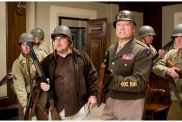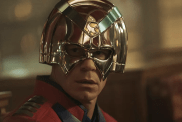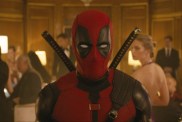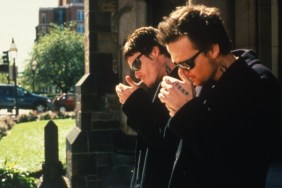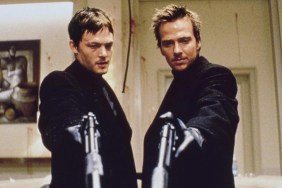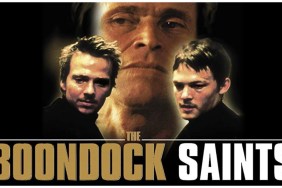“I’m coming soon… I’m coming soon… don’t move, don’t move… Oh my God, you moved! Ahhh Ahhh!”
Yes, this interview begins with a rather adolescent take on our site’s good name, and it ends with a laugh, so you know you’re dealing with a filmmaker who knows how to have a good time.
That filmmaker is Troy Duffy, who became a household name in Tinseltown when Miramax paid the Boston bartender $450,000 to write and direct his debut film with a budget of $15 million dollars, making him the kind of rags-to-riches success story the media revels in. That was 1997. Two years later, the film had been completed for less than half that budget and without the participation of Miramax, who had pulled out due to creative conflicts with Duffy. The independent distributor who purchased the movie The Boondock Saints barely released it in theaters and it marched solemnly to the direct-to-video graveyard.
Typically, this is where the Wikipedia entry ends, possibly with addendums like “Troy Duffy has not been interviewed since 1999, and currently works as a bartender in Boston.”
However, The Boondock Saints, like its main characters, was not a movie that simply lays down and dies and its director has not gone gentle into that good night. When “Saints” was released on video it gradually developed a massive cult following, grossed millions in DVD sales, and if you’ve been to a Hot Topic in the last decade you may have seen a T-shirt or two. Duffy was also the subject of a famous documentary titled Overnight, which chronicled his fast rise and fall in what could be charitably called a negative light.
Due to demand, there is now a sequel, The Boondock Saints II: All Saints Day, which picks up ten years after the first one with the two vigilante McManus Brothers, played again by Sean Patrick Flanery and Norman Reedus, called out of retirement to avenge yet more wrongdoing by Beantown Mafioso. Along for the ride is their trigger-happy-pappy Il Duce (Billy Connolly) and their new sidekick Romeo (Clifton Collins Jr.), who help them dispense with bad guys through copious gunplay and drunken antics.
ComingSoon.net spoke with returning writer/director Duffy and the two leads the night after a huge screening for fans; the interview took place, appropriately enough, at the Playwright Irish Bar in midtown Manhattan.
ComingSoon.net: I understand you guys had about a thousand people at the fan screening last night?
Norman Reedus: Was there a thousand?
Troy Duffy: I couldn’t even count, it looked like a sea of humanity. I guess the NYPD showed up to disperse the crowd afterwards.
CS: They told me that at least 300 people got turned away, and that you only posted the event on your Facebook the day before.
Duffy: We couldn’t believe the response in New York. When we rolled up I thought that line was for Michael Jackson.
Sean Patrick Flanery: I’m convinced it still is.
CS: Have you shown it in Boston yet?
Duffy: Yeah, two days ago was our first fan screening in Boston. That was f*ckin’ crazy too, same reaction from the fans. I had been waiting to see it with a crowd. Throughout making a film you have the opportunity to see it at a test screening or a screening with agents and lawyers and managers and stuff. I had not seen it with a crowd to specifically see it with a bunch of Boondock fans the first time out. I sat in that audience basically watching the crowd. They responded to everything.
CS: Were there people who hadn’t seen the first one?
Duffy: There have been a few people who haven’t seen the first one that nonetheless enjoyed the second one. The way we did it you don’t have to see the first one to understand it. You’re not lost.
Flanery: Did you see it?

CS: I did, and I was one of those people that hadn’t seen the first one. I saw the second one first but could still reverse engineer it mentally without much effort. After that I went back and watched the first one, and it clarified a few things, but overall it was pretty easy to grasp. So tell me about the ten-year saga of getting this movie off the ground, and don’t spare any of the gory details!
Duffy: The first couple years was poverty because the handlers of “Boondock Saints,” the financiers and a bunch of the companies that were involved did not pay us as the film was doing well, so we ended up suing them in a massive lawsuit that lasted for five years in which the rights to the sequel were tied up. What I’m allowed to say–because there was a settlement–was that everybody we sued settled out of court for undisclosed amounts. That was the large chunk. There was of course the very flattering documentary made about me which didn’t help matters, but I don’t know if that slowed anything down because “Boondock” was always a financial juggernaut. Anything that makes money in this business they want to do. There was always interest in doing this sequel, it was just about finding the right deal. I knew there was a base amount I needed to make a good and new and cool sequel. It was just a process of getting to that deal. Once we got there, we went.
CS: So because it was making a substantial profit on video and there seemed to be a fanbase, was there a wrangling for the rights? Were there a lot of wolves after this cub?
Duffy: You could say that, yes. You’re sorta getting into the legal side that I can’t discuss. Sometimes, unfortunately, perception is reality in Hollywood. If the sequel rights… If somebody was CLAIMING that they were involved in a lawsuit, even though maybe they actually weren’t, that’s all people need to hear to walk away.
CS: And you guys were always down?
Reedus: Yeah, from the beginning, always down. We’d heard rumors it was coming…
Flanery: Yeah, there were a couple of false starts, but we were always down. I think we all had a ball making the first one, you know? The prospect of making another one with a bunch of friends is a pretty good job to have. To be able to do it twice.
Reedus: Yeah, we’re all friends. The same with Cliff. We all know Cliff from before.
CS: You actually wrote the role for Clifton, didn’t you?
Duffy: I did. Cliff’s a friend of all of ours for a long time, probably 12 years now, and he’s an unbelievable actor, an unbelievable talent. He’s in like 78,000 movies this year. I’m glad we got him for this one because it’s something he and I always wanted to do together.
CS: I always remember him from the Kevin Reynolds movie “187.”
Reedus: That’s when I met him, right after that. We had the same agent, I was like, “Who’s that kid? I like that kid.”
CS: He played such a vicious guy in that movie and in your movie he’s such a goofball, which is kinda neat. The act of getting everyone back, did that involve a lot of juggling?
Duffy: It involved a phone call… “We’re on.” “Cool.” *click*
CS: So besides the trust you have in Troy to deliver the goods, were there specific elements of the script that appealed to you this time out?
Flanery: Yeah, there was a bunch. Upon reading the script, it was like a sequel that was deserving. It wasn’t, “They liked this, let’s give ’em more of that.” It wasn’t like that. It was a true answer to the questions that the first script posed. If he had ten parts to a story, the first one he told three of them, and he pulled the next three out of the unused seven. It was a right arm or the left. It answered those questions and filled in those holes.
Reedus: It was more the character and the experience of making it. There were definitely scenes I was super-jazzed to do, but there weren’t any scenes I wasn’t so jazzed to do. When someone asks, “What’s the favorite movie you’ve ever done?” it always comes back to this one.
Duffy: Even though “Boondock II” is very different from “Boondock I”… in this one we’re going with period piece flashbacks, things the fans are not necessarily used to. There were some direct correlations. I knew we had to revisit the rope, had to come back, and it did. I knew we had to revisit the cat in some way, had to come back, it did. There’s inside jokes for the fanbase in there, but by and large it’s a different story.
Reedus: The stuff with the father… I always like working with Billy. Seeing the two brothers is one thing, seeing the two brothers and their father is nice to me.

CS: Right, and there’s an interesting gap between the two because when the first one ends it seems like they’re really going to become full-on vigilantes, but at the beginning of the sequel they’re in Ireland living in peace.
Duffy: It was sort of a happy accident. Eight years went by, I knew we had to make up that time. You can’t just pick up where you left off if nearly a decade goes by between one and two. Also, I like the idea of hibernating bears coming out because they sense a calling. They’re getting itchy to get back out there, and they have a reason to go and clear their names. I’ve always loved that coming out of retirement thing.
CS: In the intervening ten years what have you learned about navigating this business?
Duffy: Alright, if we had eight hours I could tell you everything I’ve learned, but basically what I’ve learned is that there’s politics in this business that need to be played. People investing millions and millions of dollars into your film need to be made to feel comfortable, that you have your head screwed on straight and you’re gonna deliver. The fact that you’ve delivered before doesn’t matter to them. They need to feel comfortable, they deserve to feel comfortable, and I’ve learned to play the politics of the business. In terms of working with actors and the creative side of this business, that’s where you can use your passion, that’s where passion can come out. Actors and creative people love that. Financial and business people cannot f*cking stand it, and they shouldn’t have to.
CS: Has the fact that you’ve also been a hibernating bear give you a lot more passion for this project when you were on the set and into it?
Duffy: I think the thing that gave us more juice on this was the fanbase. When we made the first one we were just a bunch of kids that f*ckin’ took over the asylum. This one… there were fans on set. I had lighting guys coming up to me going, “Dude, ‘Boondock Saints’ is my favorite f*ckin’ movie, it’s an honor to be on this set.” I’m like, “That’s awesome… -oh God-.” They were looming over this f*cking thing. We were working for them. That’s why every day I was like, “Let’s get something that’s better than what’s on the page,” (pounding the desk) “every time we have to excel, excel, excel. Push it farther every single time.” Once they see us doing that all the craftsmen and crew members are like, “What the f*ck do you need, man? What can I do to push this thing further for you?”
Reedus: I just finished this film where one of the guys from “Twilight” was in the movie. I show up on set and there’s this huge crowd of little teenyboppers, right? I go up to the guy, I said “That must be the guy from ‘Twilight.'” He sees me and goes, “‘Boondock Saints’ is my favorite f*ckin’ movie!” I give him a sweatshirt, a T-shirt for his girlfriend. All these fangirls are there and he just B-lines and gave me a hug. He’s the big blonde!
CS: Just knowing the history of this project, “Boondock Saints” seemed to be a movie that was on life support for awhile. How did the fans keep this movie alive?
Duffy: I don’t know if I would say it was on “life support.” I think as soon as “Boondock” touched the public it lit the fire, and that fanbase started to assemble and grow and grow and grow every year since. What happened was it almost died because we were basically let down by the powers that be in Hollywood. Because of the Columbine incident we were blacklisted from U.S. screens and it was f*cking over. Thank God Blockbuster stepped up and gave us an exclusive six-month rental window in which the fans saw it. For my money, all you’ve gotta do is touch the fanbase and make something good. You touch people. When it’s out there they’ll handle it on their own. Boondock fans are responsible for the success of this film, because they found it on their own and propagated it. Talked to their buddies. That’s the story you hear over and over again. “I watched the movie because my buddy sat me in a chair and said, ‘You’re watching the f*cking movie!'” An hour-and-forty-five minutes later you’ve got another drooling “Boondock” fan. That’s what happened for ten-f*ckin’-years. Then we made the sequel and now they’re all out there actually eatin’ instead of droolin’.
Reedus: That term “life support” is interesting because we follow the fans of “Boondock Saints” because we’re connected. We hear about them all the time, we get approached all the time, our representatives follow those people. It was never on life support, but if you’re just coming in and you hear the old story of what the numbers were, it seems like we needed life support, but to us it’s totally wrong.
Duffy: Within six months of this movie coming out I’m sitting in bars having drinks listening to people quote the lines.
Reedus: We write letters to the troops. It goes on and on and on.

CS: Where do you think the appeal comes from, Sean?
Flanery: It’s the brotherly love, the camaraderie. That sense of somebody you’d do absolutely anything for. There’s a lot of things people plug into. I think the brothers dispense justice the way people sometimes want justice to be dispensed.
Duffy: Fantasize. They fantasize.
Flanery: You turn on the TV and some guy gets off leniently for some heinous crime and people think, “What’s goin’ on?” They can live out their fantasy in that way.
CS: There always seems to be a schism between the people who like and don’t like the film. Some viewers think it subtly advocates murder. Do you see it as more of a cathartic experience for people to channel those feelings vicariously through the brothers?
Duffy: We’ve done it ambiguously enough for the audience to make their own f*ckin’ decision. What I try to do in the first film is make you fall in love with the brothers in the first 15-minutes. Make those guys likeable guys you’d like to have a beer with. Therefore, when they go and commit these controversial acts you’re kinda twisted about it. You already like ’em, I already gotcha. Those people who are sorta bent towards religion and Irish heritage and drinkin’ think (bangs table) they’re chosen by God! Other people will be like, “These are the two luckiest Irish *ssholes in the f*ckin’ world right here.” They barely get out every time and manage to kill everybody. To them it’s just more fantastical fun sh*t. If you look at it they never stand up on a soap box and try to make you believe what they believe. They do their thing, they don’t ask permission, they don’t ask for anyone to follow them. They’re unapologetic about it. You like ’em, great, you don’t, go f*ck yourself. That’s why when people say, “It seems to condone vigilantism.” Well, to you. There’s a whole bunch of other people that feel differently about it. There’s people that just look at this as a complete f*ckin’ fantasy RIDE, you know? There’s this girl on the internet that plays the movie every day in the background before she goes to work just because she “likes to have the boys around.” To her it’s not about “vigilante justice” and all these big themes, she just likes them! Some people just love Rocco’s character. “We’ve had friend’s like that.” Some people don’t even ponder these questions. “It’s a goddamn movie!” To each his own.
CS: I got to talk to Billy and he referred to your directing style as having “rock ‘n’ roll attitude.” There was a negative portrayal of you in the documentary “Overnight” but I wanted to know if you’ve been able to take that notoriety and actually use it to your advantage?
Duffy: (laughs) Finally a new question from one of these motherf*ckers! YES, frankly. I think I almost should say “thank you” to those guys sometimes. It’s helped make me more controversial than I actually am, and controversy in this business is worth its weight in gold. Unfortunately it’s not true. I worked very hard just to be able to do what I do, and sometimes that film does not necessarily help out, but the net that it’s cast is like, “Troy’s this crazy, John Huston, f*ckin’ weird controversial guy,” and sometimes that does work for me, you know? So thanks for that, douchebags.
CS: So would it be fair to say it’s a “there’s no such thing as bad publicity” kinda deal.
Duffy: Yeah, but I don’t actually believe that, ’cause there is such a thing as bad publicity. The pedophile publicity, that’s bad. The drug-addicted, waking up in other people’s houses… there’s bad publicity. Things that simply don’t work for you because they challenge your very ability to work at all. This kind of publicity, I can take it.
CS: Rocco’s line at the beginning of the film about how there are people that “talk” and people that “do”… is that your driving philosophy?
Duffy: Oh, of course, but you can actually apply that to life. There’s a lot of people that love to just talk about sh*t and never actually take the risk, show some balls, and stand up and do it. It’s safer, isn’t it? It’s safer to say “no,” safer to stay home and smoke pot and point the finger at people that are doing sh*t and then voice your f*cking two-cent opinion. It’s a lot harder to actually go out there and do it, and those are the people I listen to and those are the people I respect. The doers. In ALL areas of life, not the people that sit on the sidelines.
CS: Well thank you very much, gentlemen.
Flanery: You’re very welcome.
Duffy: Good questions. Some people actually put some thought into this sh*t! (laughs)
The Boondock Saints II: All Saints Day will begin a limited theatrical release on Friday, October 30. You can find the list of theaters playing the movie on the Official Site. Also, check out our interview with Billy Connolly and you can view photos from the premiere here.
